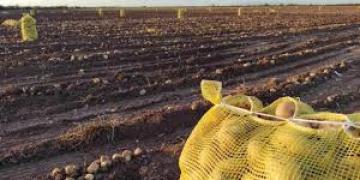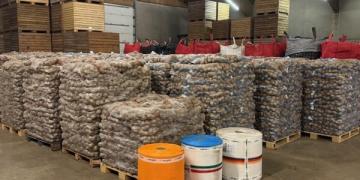Spain: Soil emerges as a strategic element for potato cultivation
The 2nd Agroprofessional Potato Meeting brought together more than 100 farmers and technicians to discuss the current state of the crop, health threats, and the challenges of agricultural sustainability.

The 2nd Agroprofessional Potato Meeting in La Rinconada (Seville) , organized by Campo Magazine, offered more than one hundred industry professionals a real-life overview of the current situation. During the meeting, which coincides with the start of the potato season in Andalusia, forecasts were analyzed, focusing on health threats and the challenges of agricultural sustainability.
The event began with a tour of the facilities of Patatas Arrébola , a second-generation company, accompanied by its manager, José Peláez. They moved to a processing center in 2023, which covers 10,000 m2, "where we have room to grow." The group produces 40 million kilos per year and currently has a daily capacity of 60,000-70,000 kg of finished product. Patatas Arrébola focuses on national distribution to chains such as Más, Lidl, Aldi, El Corte Inglés, and Macro, as well as to traditional markets through MercaSevilla, MercaCórdoba, and MercaJerez.
Campaign analysis
During the visit, the manager of Patatas Arrébola analyzed the progress of the campaign, lamenting the damaging effect of the rains. "This year, it seemed like the drought problem had been solved with good plantings, but after the rains, there will be a drop in production, although it is still somewhat difficult to estimate." Peláez believes supplies will be normal, although without the expected surpluses.
Regarding prices, he explains that there is still little produce from Seville on the market, but in Cartagena, depending on quality, they are selling for farmers in the 60-70 cent range, "quite good prices. We’ll have to see how the market develops when the campaign begins."
Regarding supply, although the (early) French green potato season has recovered a couple of years ago, "the quantities are still not sufficient to supply supermarkets," so it is necessary to supplement with French potatoes from storage and origins such as Israel or Egypt. On this point, Peláez highlighted the interest of supermarkets in domestic produce. "Some already abandon storage potatoes between Spanish and Israeli and Egyptian products in January-February, while others are coexisting because storage potatoes are more economical."
Technical presentations
After the visit to Patatas Arrébola, the meeting moved to Hacienda de Santa Cruz, located in the municipality of Seville, to continue with a series of presentations by leading experts.
Alejandro Sanz, a Corteva technician , presented Sullicab, an innovative solution based on four strains of Bacillus selected after rigorous research that are revolutionizing the way we understand plant nutrition and crop sustainability. The application of Sullicab stimulates root development and improves nutrient absorption efficiency, which is reflected in improved plant growth and the quality and post-harvest life of the final product. Among its benefits for potato cultivation are "higher total production, greater uniformity and number of commercial sizes, and improved quality and health of the crop and harvest," explained Sanz.
For his part, Francisco Romero, Commercial Director for Southern Spain at Fertinagro , began his presentation with a question: How can sustainable agriculture be profitable? He explained to the audience that the fertilizer sector "is in the eye of the storm" because "we have the greatest impact on CO2 emissions," which will make adaptation to the EU roadmap difficult.
Faced with this situation, Fertinagro is committed to "sustainable yet profitable" solutions, with an increasingly important role for technology, with fertilization plans using biostimulants "as a tool for success."
Meanwhile, Xavier Moncosí, from Lainco , addressed one of the key issues of this campaign, mildew, and showed attendees a figure: 8,433,041 euros, "the economic impact of fungal control on potato crops in Spain", focusing on one of the major current challenges, the lack of effective tools to combat this disease.
At this point, Sivar Gold was introduced, a fungicide composed of two active ingredients with excellent resistance management. Among its benefits, it protects crops during times of greatest risk by stimulating the plant’s natural defenses.
Finally, Francisco Pérez, from Alltech Crop Science Iberia , pointed out that, to achieve profitable and sustainable crops, "it’s not just about applying one or two solutions, but also about knowing what’s happening to the soil." The company has been working for years on strategies "that promote a balanced soil microbiome" with leading products such as its biostimulant Soil-Set, which promotes the generation of suppressive soils, reducing pathogen pressure, increasing crop yield, and improving growth, quality, and antioxidant production.
Following the presentations, a roundtable discussion moderated by Máximo Gómez, director of Campo Magazine, allowed for an exchange of views on the present and future of the sector with Marco Román (Contagri), Álvaro Barrera (Dehesa de labradores), Carlos García (Aerobur), Francisco Carrasco (Feragua), and Urbano Herrero (Fitesa). The speakers highlighted this year’s difficult rainy season, with a high incidence of disease, emphasizing the need for active ingredients and pointing to solutions such as the use of drones, "which are not a miracle, but are a very effective tool." "The sector has a future, and we will continue to invest in it; we will continue to walk the path," they concluded.
The day ended with a visit to the Contagri facilities in Aznalcázar to learn about the working methods of these members of ’Meléndez X Origen’, a community launched by the company Patatas Meléndez built to promote the exchange of experiences between the different production areas and which aims to guarantee the transfer of knowledge between the different links in the value chain.
Fuente: revistamercados.com




